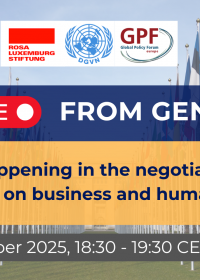GPF Europe’s core mission is to monitor policy making at the United Nations. This includes thematic areas such as sustainable development, human rights, and financing for development as well as global governance, multilateralism, and the funding and reform of the United Nations system.
The UN is the most inclusive international organization with nearly universal membership and commitments to peace, sustainable development and human rights. GPF Europe has a two-pronged approach - to advocate for values espoused by the UN and its agreements, while monitoring and exposing impediments that challenge proper UN operations. These include increasing corporate capture of policy-making at the UN, inadequate funding from the Member States and disregard of their UN agreements.
In this section we post information, analyses, documents, and background material related to multilateralism, the state of the United Nations and its reform, the financing of international organizations, the role of various international “clubs” (like the G20), new forms of public-private interactions, like multi-stakeholder initiatives and global partnerships, the modi operandi of global institutions and their subsidiary bodies, and the role of civil society organizations and social movements. Additional material such as tables and charts on UN Finance is available in our archive.
By Bodo Ellmers
In late January, United Nations (UN) Secretary-General António Guterres sent a dramatic letter to UN Member States warning about the “imminent financial collapse” of the United Nations Organization. The letter followed earlier warnings that the UN Secretariat might have to reduce expenditure from the regular budget by 15 percent in 2026. This would mean reducing the workforce by about 2,600 staff.
The situation for many of the UN funds and programmes that rely on voluntary contributions to [...]




